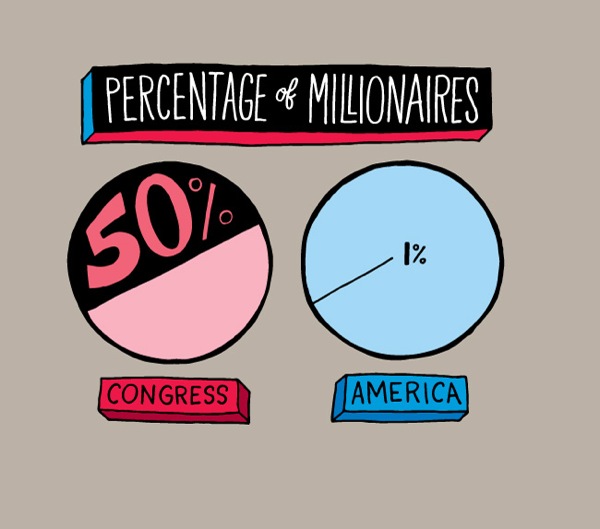The Problem:
The functions of parliament cover representation and consensus building: representation was dealt with in a previous blog and the conclusion is that parliaments are definitely not representative of the people and random sampling is much more representative (probably simpler and cheaper too).
Apart from approving decisions, parliaments contribute to democracy by negotiating consensus or at least a majority on issues. Discussions are mainly about laws, control of the government and the budget.
Parliament is supposed to consists of representatives of every section of society but the 99% does not feel represented. No wonder because more than half of the US congresspersons are millionaires and therefore belong to the 1%. It will not be too different in the rest of the world. (graph by Chris Piascik.)
Access to our representatives is crowded and only specialists manage to get through. The specialists are expensive and in the US alone about 3.5 billion USD was spent on lobbying in 2010. That amounts to about 6.5 million USD per congressperson! No wonder the 99% cannot afford to have their voice heard.
The Solution:
Simple: abolish parliament! Who will discuss laws, control government and agree on a budget? Let's discuss drafting of laws in this blog. The next blogs will discuss control of government and the budget.
In the system without parliament, anybody can draft a law and put it on the government draft bill site. Every citizen has a log-in into that draft bill site and can like or +1 a draft proposal. Once a threshold of say 2% of the number of citizens has like-ed or +1-ed the draft bill proposal, the draft bill will be tabled and a date for a vote by a randomly selected panel of citizens is set.
Between the moment the bill is tabled and the moment the bill is voted on, a discussion takes place on the draft bill website. Amendments can be proposed and like-ed or +1-ed. It is in the interest of the proposers of the bill to include all popular amendments because it will increase the chances that their final bill will be accepted.
Once the draft bill is final, those participating in the discussion take a position pro or against the bill with a clear explanation why. Again each position can be like-ed or +1-ed. Now the panel of citizens is randomly selected. Each of the groups who has at least 10% of the likes or +1s can make a presentation to the randomly selected panel. (So maximum 10 presentations.) Each group therefore has an interest to join other statements until they reach at least 10% of the total likes or +1s. If not they will not be able to present their view.
Presentations are not face to face but through the website so everybody can see and the panel remains anonymous so it can not be lobbied by big money.
After the presentations, the panel votes and the bill is accepted or rejected. Simple!
The Transition:
1. As with the representation approach explained a previous blog, the first step would be the use of this system in parallel with the existing parliament. Parliament would still vote but the drafting by citizens is informing their proposed amendments in parliament. A hybrid system has already been used in Iceland to develop a new constitution but world wide general assemblies will be crucial in further developing such a hybrid system.
2. In stead of lobby groups, the groups with more than 10% of the likes or +1s on the draft bill website will get the opportunity to address congresspersons or parliamentarians. First informally, later in parliament.
3. Once the system has been thoroughly tested, a major overhaul of the constitution through crowdsourcing can introduce legislative drafting in line with the proposal above.
The functions of parliament cover representation and consensus building: representation was dealt with in a previous blog and the conclusion is that parliaments are definitely not representative of the people and random sampling is much more representative (probably simpler and cheaper too).
Apart from approving decisions, parliaments contribute to democracy by negotiating consensus or at least a majority on issues. Discussions are mainly about laws, control of the government and the budget.
Parliament is supposed to consists of representatives of every section of society but the 99% does not feel represented. No wonder because more than half of the US congresspersons are millionaires and therefore belong to the 1%. It will not be too different in the rest of the world. (graph by Chris Piascik.)
Access to our representatives is crowded and only specialists manage to get through. The specialists are expensive and in the US alone about 3.5 billion USD was spent on lobbying in 2010. That amounts to about 6.5 million USD per congressperson! No wonder the 99% cannot afford to have their voice heard.
The Solution:
Simple: abolish parliament! Who will discuss laws, control government and agree on a budget? Let's discuss drafting of laws in this blog. The next blogs will discuss control of government and the budget.
In the system without parliament, anybody can draft a law and put it on the government draft bill site. Every citizen has a log-in into that draft bill site and can like or +1 a draft proposal. Once a threshold of say 2% of the number of citizens has like-ed or +1-ed the draft bill proposal, the draft bill will be tabled and a date for a vote by a randomly selected panel of citizens is set.
Between the moment the bill is tabled and the moment the bill is voted on, a discussion takes place on the draft bill website. Amendments can be proposed and like-ed or +1-ed. It is in the interest of the proposers of the bill to include all popular amendments because it will increase the chances that their final bill will be accepted.
Once the draft bill is final, those participating in the discussion take a position pro or against the bill with a clear explanation why. Again each position can be like-ed or +1-ed. Now the panel of citizens is randomly selected. Each of the groups who has at least 10% of the likes or +1s can make a presentation to the randomly selected panel. (So maximum 10 presentations.) Each group therefore has an interest to join other statements until they reach at least 10% of the total likes or +1s. If not they will not be able to present their view.
Presentations are not face to face but through the website so everybody can see and the panel remains anonymous so it can not be lobbied by big money.
After the presentations, the panel votes and the bill is accepted or rejected. Simple!
The Transition:
1. As with the representation approach explained a previous blog, the first step would be the use of this system in parallel with the existing parliament. Parliament would still vote but the drafting by citizens is informing their proposed amendments in parliament. A hybrid system has already been used in Iceland to develop a new constitution but world wide general assemblies will be crucial in further developing such a hybrid system.
2. In stead of lobby groups, the groups with more than 10% of the likes or +1s on the draft bill website will get the opportunity to address congresspersons or parliamentarians. First informally, later in parliament.
3. Once the system has been thoroughly tested, a major overhaul of the constitution through crowdsourcing can introduce legislative drafting in line with the proposal above.



Thanks for this write up, I was specifically looking for something already written on this subject that very often sparks into my mind.
ReplyDeleteOne question, about your proposal: why do you want to randomly select a panel of representatives, instead of letting everybody vote on the proposals, just like in the first pass of the procedure?
Dear Fabio,
ReplyDeleteThank you very much for your comment. It is a great question. I will try to explain in more detail in a separate blog post. In a few words, the people who are on the internet discussing and engaging are not necessarily a representative sample of the total population. If you take a random sample, you are 95% or 99% CERTAIN that the majority of the population agrees. No parliament in this world can give the same guarantee. There are other advantages: for example, you can run 10 or 100 or 1000 proposals at the same time and still be certain that the whole population would have agreed if they would have been asked.
I am looking forward to writing a more elaborate answer in my next blog. (i had some spam attacks, so still recovering.)